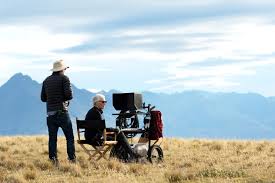Jane Campion: The Cinema Woman 2022 Movie Review
In 2007, to celebrate its 60th anniversary, the Cannes Film Festival commissioned an omnibus film, inviting 36 filmmakers to contribute three-minute short films to Chacun Son Cinema †Everyone has their own cinema† There was one woman among them: Jane Campion. She received the same award, as the only representative of her gender, at a ceremony that year honoring the directors of past Palme d’Or winners. In Julie Bertuccelli’s captivating and insightful portrait, well-chosen clips of these gatherings impress the great, capturing not only the thin air but the uncomfortably obvious imbalance of it all. At a festival press conference, Campion is called upon to comment on the elephant in the room – no, not Roman Polanski, who is sitting right behind her – and she does so with acumen and passion.
Bertucelli (Since Otar Left) is interested in how the New Zealand-born author has built a career in a male-dominated industry. But more than that, she is concerned with the indelible body of work itself, with its liminal dream states and “deliberate weird women,” as Campion describes the protagonists who have commanded her attention for years, until her recent superlative in male-centric territory with The power of the dog.
One of the strengths and joys of Jane Campion: The Cinema Woman is that, with a few short exceptions, it does not resort to talking commentary? about camp; excerpts of interviews that the writer-director has done over the years, it gives us hair voice (and her smile!). She recalls the challenges and breakthroughs of directing a production, from her film school days to the films that put her on the international map. Weaving her commentary with scenes from the films and making-of footage, all cleverly edited by Laure Gardette and Svetlana Vaynblat, the documentary shows Campion’s sense of humor and purpose.
As the child of Shakespeare-worshipping theater people, she was probably destined for a life in the arts, and her affection and respect for actors is rooted in her parents’ work. Richard Campion was a director and Edith an actor. As an actor herself — a short-lived pursuit and one that didn’t make her heart sing — Campion appeared in at least one of her father’s productions. It was when she picked up a camera that she found her calling. And eventually she would direct her mother, who played a notable role in An angel at my table†
Campion is candid about the limits of her tech know-how during her college days, and she’s just as clear that when she started working professionally, certain male crew members treated her with outrageous brutality. She did it for work, but never pretended to like them. She embraced her role as boss.
Campion started out in a male-dominated company and didn’t necessarily want to compete with the men. She understood that pursuing the ideas and visions that were “so peculiar” to her would set her films apart. And they did, starting with such memorable shorts as A girl’s own story and passionless moments† Turning everyday absurdities into something strange and light, her short films made a lasting impression on me when they were screened in 1988 in the Back of Beyond series at UCLA, a historical survey of film and television from Australia, where Campion now was established. Peel, one of the shorts she made as a student, provoked this advice from her teachers: destroy it. She ignored their advice. Peel was selected for Cannes and won the top prize for short films.
Campion says she understands that some people hate her job. Bertuccelli includes post-screening reactions, yes and no, to two of her Cannes premieres: her 1989 feature debut, babyand 1993’s The piano, who would receive the Palme, making Campion the first female director to receive the honor. (It would take her years to feel the joy of that barrier-breaking achievement, the victory overshadowed by unfathomable grief: the death of her newborn baby just days later.) At the screening of baby, an outer image of family dysfunction and a woman’s furious non-conformity, the filmmaker was stunned by the exodus of onlookers. But Pierre Rissient (aka Man of Cinema), the critic-curator-programmer who championed her early work, assured her that those who remained were “the right people.” Talking about the right people, a radiant Agnès Varda, leaving the Palais after The pianothinks it’s “wonderful and “weird”.
The longest part of the documentary is devoted to that dark jewel, the story of an arranged marriage on the New Zealand border and a breakthrough for Campion and movies in general. Campion explains her hesitation about directing an actor as accomplished as Harvey Keitel, who stars opposite Holly Hunter, Sam Neill and 10-year-old Anna Paquin. The director contacted Keitel before production began, and they agreed on a plan for how they would work together, one that would combine his improv approach with her rehearsal-focused strategy. Her candor about figuring out and building trust with actors is bright and endearing, as is her take on masculinity and femininity, aspects of the story that some people might dismiss as outdated or old-fashioned. But in conversations and in her films, Campion is attuned to what is primary about duality, and to the ways in which women, cut off from official power for centuries, channel their secrets and their hidden lives into something powerful in their own right.
That power is evident from the cinema woman‘s scenes of Campion at work, and in the clever selection of clips that focus on her complicated female characters – Genevieve Lemon in babyKerry Fox as the great writer Janet Frame in An angel at my tableKate Winslet as New Age seeker in Holy smoke. There is the unconventional intimacy of historical pieces Portrait of a lady (Nicole Kidman), bright star (Abbie Cornish) and The pianoand the contemporary spins on women facing the darkness and horrors of crime, in the divisiveness in the cut (Meg Ryan) and the critically acclaimed series top of the lake (Elisabeth Moss).
From the shorts to the Oscar-winning western Power of the dog, it is a filmography that embodies a commitment to personal expression; there may be moments that don’t live up to Campion’s intent, but none of them are generic. Fittingly, Bertuccelli closes the document with a scene from… An angel at my table which Frame observes in a moment of beautiful idiosyncrasy, and yet a moment that every artist will recognize: the moment when you know that you have captured lightning and turned it into something new.




